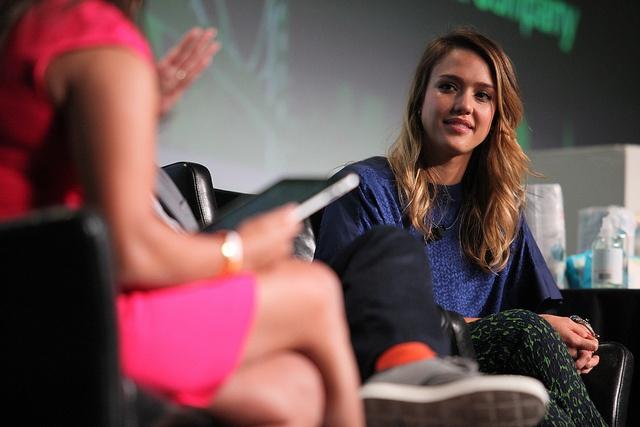
The Honest Company, a line of eco-friendly baby, personal care and cleaning products dreamed up by Jessica Alba, has become wildly popular among parents looking for an alternative to Pampers and Johnson & Johnson. But, in a marketplace overcrowded with questionable celebrity products – from Suzanne Somer’s ThighMaster to Jessica Simpson’s line of edible cosmetics – is it any wonder a conscious consumer would approach a company created by a Hollywood actress with a heavy dose of skepticism?
To find out if the Honest Company is serious about sustainability, a good place to start is its origin story. Alba said the idea to create her own baby product line came to her when she was pregnant with her first child: Alba’s mother recommended a laundry detergent specially formulated for babies that she had used during Alba’s own childhood, Alba said in an interview with the Thomas Reuters Foundation. But when the “Sin City” actress used the detergent, she broke out into a rash – which motivated her to investigate the health effects of chemicals in everyday consumer products.
After reading “Healthy Child Healthy World” as part of her personal research, Alba approached the book’s author Christopher Gavigan and, as she told Fast Company, “…I hounded him for a year. I said, ‘I appreciate you’ve given me a handbook, but you haven’t given me a solution. Let’s make a solution.’” And they did: In 2012, Alba and Gavigan, the former CEO of nonprofit Healthy Child Healthy World, launched the Honest Company with nontoxic products ranging from diapers and baby wipes to (yes) laundry detergent and floor cleaner.
Alba’s personal passion for healthier products and her collaboration with environmental health leader Gavigan make a compelling case for the legitimacy of the Honest Company – as do the products themselves. On its website, the Santa Monica, California-based startup explained its approach to designing products and avoiding problematic chemicals and additives: While most companies will only consider an ingredient as toxic if it has immediate health impacts, Honest “takes a full consideration of potential chronic (long-term) impacts, exposure routes, unique windows of vulnerability and a wide spectrum of potential health impacts including carcinogenicity, teratogenicity, allergenicity, neurotoxicity and more.” The company stays up-to-date on the latest science in the toxicology field and is constantly adding new ingredients to its list of “toxic offenders” like phthatates and parabens.
The Honest Company may focus on environmental health and toxicity, but the startup also strives for broader environmental and social responsibility in its products and business operations, according to its website. Honest avoids petroleum-based products whenever possible (Honest diapers are made from a blend of corn and wheat), uses post-consumer plastic in its plastic packaging and is a certified B Corporation.
But, more importantly, the company appears to try to live up to its name – recognizing it can never be perfect (though it may aim for the eco-ideal), but offering customers full transparency (yes, honesty) about its products and operations.
And the company’s philosophy of openness and the quality of its products have clearly struck a chord with consumers: Honest is well on its way to tripling its revenues to $150 million this year, according to Upstart Business Journal. The startup also owes its success to its convenience and affordability (Honest keeps prices accessible by offering a home-delivery subscription service), as well as the stylish design of its products, especially its fun diaper prints (Honest may have taken a lesson from Method that green doesn’t have to mean drab and boring).
What’s next for the Honest Company? The startup is looking to expand into skin care and beauty product lines, according to Fast Company, and raised $70 million of venture capital funding this summer, Upstart Business Journal reported. But, as buzz about an IPO heightens, Brian Lee, another company co-founder, told VatorNews that Honest Company won’t sell to a larger corporation – because then it couldn’t stay true to its principles of making healthy, safe products.
"There are so many companies out there start with the right intentions," Lee said. "They say, 'I'm gonna make a car that's better for you,' or whatever, and they sell out. They sell out very early. They haven't made that impact and will sell to a large CPG [consumer packaged goods] company. The first thing that these companies do is they change the formulations on the products. So you haven’t achieved anything. You might have put some bucks in your pocket, but you haven't changed anything. And we started with the idea that we wanted to make that change."
Image credit: Flickr/TechCrunch
Passionate about both writing and sustainability, Alexis Petru is freelance journalist based in the San Francisco Bay Area whose work has appeared on Earth911, Huffington Post and Patch.com. Prior to working as a writer, she coordinated environmental programs for Bay Area cities and counties. Connect with Alexis on Twitter at @alexispetru

Passionate about both writing and sustainability, Alexis Petru is freelance journalist and communications consultant based in the San Francisco Bay Area whose work has appeared on Earth911, Huffington Post and Patch.com. Prior to working as a writer, she coordinated environmental programs for various Bay Area cities and counties for seven years. She has a degree in cultural anthropology from UC Berkeley.














